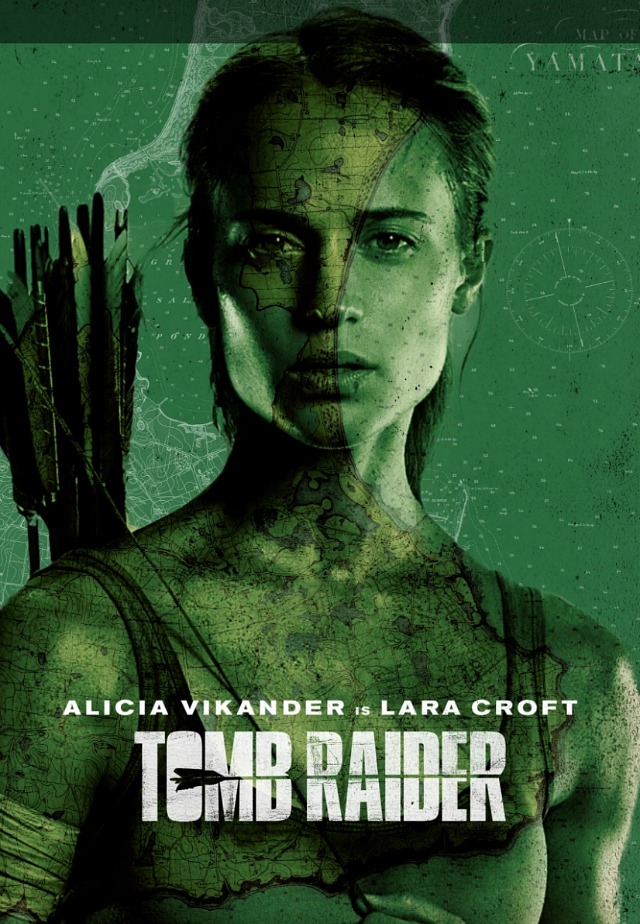Tomb Raider (Warner Bros., 3.16) is a third-rate, totally-by-the-numbers, CG-propelled exercise in female adventurer myth-building.
With the exception of Alicia Vikander‘s defiantly emotional performance as Lara Croft, which is surprisingly decent considering the circumstances, this cinematic effort by the great Roar Uthaug (pronounce his last name over and over until you can say it backwards in your sleep) struck me as a mostly boring, time-wasting programmer — a 21st century equivalent of Allan Quatermain and the Lost City of Gold.
Don’t let this and the other cruddy reviews stop you this weekend. You wanna see how Vikander measures up, right?

The truth is that this Swedish-born Oscar winner, all of 29, isn’t half bad as the video-game adventurer with the bow-and-arrow and the buff bod. She’s too small (5’5″) to be a convincing whup-asser and I could have done with fewer cries of pain, but she gives this gamer character everything she has inside, trying like hell to make Croft’s situation feel as earnest and real-deal as possible. Vikander certainly gives a more full-hearted performance than Angelina Jolie did in those two Lara Croft flicks (’01 and ’03) that came and went without stirring a single bowl of soup. And comparing VK’s boobs to Jolie’s is a non-issue.
The first 35 minutes of Tomb Raider are the most plausible and therefore tolerable, as they happen in a semblance of real-world London (Croft’s home) and Hong Kong, and then aboard a small ship bound for a remote location in the South China Sea.
Croft is a reluctant heiress. Yeah, I know — what kind of idiot says “nahh, I don’t want an inheritance — I’d rather be in debt as I deliver pizza on a bicycle”? She’s torn up about her disappeared and presumably dead tycoon dad (Dominic West) who vanished in ’09 while researching Himiko, the legendary shaman queen who was buried alive on the island of Yamatai, somewhere southeast of Japan.
A clue found in one of her dad’s effects results in Lara travelling to Hong Kong and then paying a ship owner (Daniel Wu as the good-looking, physically agile Asian guy who has to appear in all international-appeal action films) to take her to this place of rocky foreboding. The last good thing that happens in Tomb Raider is when Wu’s ship is destroyed as it crashes against jagged rocks on the Yamatai coast, and all of it in darkness. It’s basically the same misfortune that befell Gregory Peck and his team of saboteurs in The Guns of Navarone. The dark, cliffy turf also reminds you of Peter Jackson‘s Skull Island in King Kong.
The soaked Wu and Vikander escape the wreckage but are soon taken prisoner by a team of mercenary archeaologists led by…good God, no…noooo!….it’s Walton Coggins! The appearance of this laid-back, Tarantino-favored, Emmy-awarded actor with the gray-flecked beard tells you “okay, the movie is fucked from here on, or at least you are as long as you keep watching it.”
The rest of Tomb Raider — mostly Yamatai with a finale back in London — is all sludge and silliness. Occasionally cheesy writing, bullshit spectacle (stone-moving mechanisms and trap doors that function perfectly after hundreds of years of stillness) and absurdly over-rendered action sequences.
I was especially infuriated by a sequence in which Croft, armed only with her trademark bow-and-arrow, infiltrates the mercenary camp and then does battle with a bunch of snarly guys armed with automatic rifles. The notion that Croft would hold her own and even kill a couple of baddies without catching a stray bullet is categorically insane. Remember that comic moment in Raiders of the Lost Ark when a chuckling North African villain whips out a large Arabian sword, only to be casually shot by Harrison Ford? Same deal here except Vikander is the sword guy. Lunacy.
The more crazy stuff is thrown at you, the more the walls start to close in, and all you want to do is bolt for the exit. Which is what I did at…oh, the 100-minute mark. I knew it had another 18 or 20 minutes to go but I really, really didn’t want to deal with the ghost of Humiko, and I knew I could read the Wiki synopsis when I got home so what different could it make?









